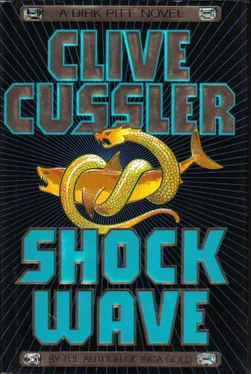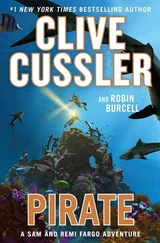Clive Cussler - Shock Wave
Здесь есть возможность читать онлайн «Clive Cussler - Shock Wave» весь текст электронной книги совершенно бесплатно (целиком полную версию без сокращений). В некоторых случаях можно слушать аудио, скачать через торрент в формате fb2 и присутствует краткое содержание. Год выпуска: 1996, ISBN: 1996, Издательство: Simon & Schuster, Жанр: Детектив, на английском языке. Описание произведения, (предисловие) а так же отзывы посетителей доступны на портале библиотеки ЛибКат.
- Название:Shock Wave
- Автор:
- Издательство:Simon & Schuster
- Жанр:
- Год:1996
- ISBN:978-0684802978
- Рейтинг книги:5 / 5. Голосов: 1
-
Избранное:Добавить в избранное
- Отзывы:
-
Ваша оценка:
- 100
- 1
- 2
- 3
- 4
- 5
Shock Wave: краткое содержание, описание и аннотация
Предлагаем к чтению аннотацию, описание, краткое содержание или предисловие (зависит от того, что написал сам автор книги «Shock Wave»). Если вы не нашли необходимую информацию о книге — напишите в комментариях, мы постараемся отыскать её.
Shock Wave — читать онлайн бесплатно полную книгу (весь текст) целиком
Ниже представлен текст книги, разбитый по страницам. Система сохранения места последней прочитанной страницы, позволяет с удобством читать онлайн бесплатно книгу «Shock Wave», без необходимости каждый раз заново искать на чём Вы остановились. Поставьте закладку, и сможете в любой момент перейти на страницу, на которой закончили чтение.
Интервал:
Закладка:
Maeve breathed in the night. “Yes, I can’t deny devoting my life to it.”
Giordino broke the moment by emerging from the deckhouse and announcing that one of the buoyancy tubes was losing air. “Pass the pump,” he ordered. “If I can find the leak, I’ll try and patch it.”
“How is Marvelous Maeve holding up?” Pitt asked.
“Like a lady in a dance contest,” Giordino replied. “Limber and lithe, with all her body joints working in rhythm.”
“She hangs together until we reach the island and I’ll donate her to the Smithsonian to be displayed as the boat most unlikely to succeed.”
“We strike another storm,” said Giordino warily, “and all bets are off.” He paused and casually glanced around the black horizon where the stars melted into the sea. Suddenly, he stiffened. “I see a light off to port.”
Pitt and Maeve stood and stared in the direction Giordino indicated with his hand. They could see a green light, indicating a ship’s starboard side, and white range masthead lights. It looked to be passing far in their wake toward the northeast.
“A ship,” Pitt confirmed. “About five kilometers away.”
“She’ll never see us,” said Maeve anxiously. “We have no lights of our own.”
Giordino disappeared in the deckhouse and quickly reappeared. “Rodney York’s last flare,” he said, holding it up.
Pitt gazed at Maeve. “Do you want to be rescued?”
She looked down at the black sea rolling under the boat and slowly shook her head. “It’s not my decision to make.”
“Al, how say you? A hearty meal and a clean bed strike you as tempting?”
Giordino grinned. “Not half as inviting as a second go-around with the Dorsett clan.”
Pitt circled an arm around Maeve’s shoulder. “I’m with him.”
“Two days,” Maeve murmured thankfully. “I can’t believe I’ll actually see my boys again.”
Pitt said nothing for a moment, thinking of the unknown that lay ahead of them. Then he said gently, “You’ll see them, and you’ll hold them in your arms. I promise you.”
There was never any real inclination to turn from their established goal. Pitt and Giordino’s minds ran as one. They had entered a zone where they were indifferent and uncaring of their own lives. They were so wrapped up in their determination to reach Gladiator Island that neither man bothered to watch as the lights of the passing ship grew smaller and gradually disappeared in the distance.
When the interisland cargo ship carrying the dismantled antenna steamed into Halawa Bay on Molokai, all hands lined the railings and stared in rapt fascination at the peculiar vessel moored in the harbor. The 228-meter-long ship, with its forest of cranes and twenty-three-story derrick rising in the middle of its hull, looked like it had been designed and constructed by an army of drunken engineers, spastic welders and Oklahoma oil riggers.
An expansive helicopter pad hung over the stern by girders as if it was an add-on accessory. The high bridge superstructure rose on the aft end of the hull, giving the ship the general look of an oil tanker, but that’s where any similarity ended. The center section of hull was taken up by an enormous conglomeration of machinery with the appearance of a huge pile of scrap. A veritable maze of steel stairways, scaffolding, ladders and pipes clustered around the derrick, which reached up and touched the sky like a gantry used to launch heavy rockets into space. The raised house on the forecastle showed no sign of ports, only a row of skylight-like windows across the front. The paint was faded and chipped with streaks of rust showing through. The hull was a marine blue, while the superstructure was white. The machinery had once been painted myriad colors of gray, yellow and orange.
“Now I can die happy after having seen it all,” Gunn exclaimed at the sight.
Molly stood beside him on the bridge wing and stared in awe. “How on earth did the admiral ever conjure up the Glomar Explorer?”
“I won’t even venture to guess,” Gunn muttered, gazing with the wonder of a child seeing his first airplane.
The captain of the Lanikai leaned from the door of the wheelhouse. “Admiral Sandecker is on the ship-to-ship phone, Commander Gunn.”
Gunn raised a hand in acknowledgment, stepped from the bridge wing and picked up the phone.
“You’re an hour late,” were the first words Gunn heard.
“Sorry, Admiral. The antenna was not in pristine shape. I ordered the crew to perform routine repair and maintenance during disassembly so that it will go back together with less hassle.”
“A smart move,” Sandecker agreed. “Ask your captain to moor his ship alongside. We’ll begin transferring the antenna sections as soon as his anchors are out.”
“Is that the famous Hughes Glomar Explorer I’m seeing?” asked Gunn.
“One and the same with a few alterations,” answered Sandecker. “Lower a launch and come aboard. I’ll be waiting in the captain’s office. Bring Ms. Faraday.”
“We’ll be aboard shortly.”
Originally proposed by Deputy Director of Defense David Packard, formerly of Hewlett-Packard, a major electronics corporation, and based on an earlier deep ocean research ship designed by Willard Bascom and called the Alcoa Seaprobe, the Glomar Explorer became a joint venture of the CIA, Global Marine Inc. and Howard Hughes, through his tool company that eventually became the Summa Corporation.
Construction was commenced by the Sun Shipbuilding & Dry Dock Company at their shipyard facilities in Chester, Pennsylvania, and the huge vessel was immediately wrapped in secrecy, with the aid of misleading information. She was launched forty-one months later in the late fall of 1972, a remarkable achievement in technology for a vessel completely innovative in concept.
She then became famous for her raising of a Russian Golf-class submarine from a depth of five kilometers in the middle of the Pacific. Despite news stories to the contrary, the entire sub was raised in pieces and examined, a colossal feat of intelligence that paid great dividends in knowledge about Soviet submarine technology and operation.
After her brief moment of fame, no one quite knew what to do with the Explorer, so she eventually wound up in the hands of the United States government and was included in the Navy’s mothball program. Until recently, she had languished for over two decades in the backwash of Suisun Bay, northeast of San Francisco.
When Gunn and Molly stepped onto the deck of the immense vessel, they felt as though they were standing in the center of an electric generating plant. Seen close up, the scope of the machinery was staggering. None of the tight security that surrounded the vessel during her first voyage was visible. They were met at the top of the boarding ramp by the ship’s second officer and no one else.
“No security guards?” asked Molly.
The officer smiled as he showed them up a stairway leading to a deck below the wheelhouse. “Since this is a commercial operation and we’re not on a secret mission to steal foreign naval vessels from the seafloor, no security measures are necessary.”
“I thought the Explorer was in mothballs,” said Gunn.
“Until five months ago,” replied the officer. “Then she was leased to Deep Abyss Engineering to mine copper and manganese from the deep ocean two hundred kilometers south of the Hawaiian Islands.”
“Have you begun operations?” asked Molly.
“Not yet. Much of the ship’s equipment is ancient by today’s standards and we’ve had to make some major changes, especially to the electronics. At the moment, the main engines are acting up. Soon as they’re repaired, we’ll be on our way.”
Gunn and Molly exchanged questioning looks without voicing their concern. As if tuned to the same wavelength, they wondered how a ship that was dead in the water could get them where they had to be in time to deflect the acoustic plague.
Читать дальшеИнтервал:
Закладка:
Похожие книги на «Shock Wave»
Представляем Вашему вниманию похожие книги на «Shock Wave» списком для выбора. Мы отобрали схожую по названию и смыслу литературу в надежде предоставить читателям больше вариантов отыскать новые, интересные, ещё непрочитанные произведения.
Обсуждение, отзывы о книге «Shock Wave» и просто собственные мнения читателей. Оставьте ваши комментарии, напишите, что Вы думаете о произведении, его смысле или главных героях. Укажите что конкретно понравилось, а что нет, и почему Вы так считаете.












